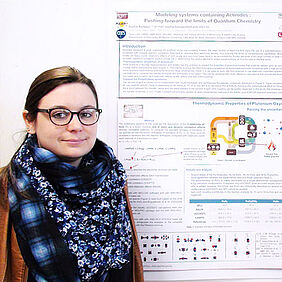Thesis defence of Sophie Kervazo phlam
Doctorants phlam PCMT Soutenance de thèse Vie du labo
1A12 IUT A
Abstract of the thesis
The main question of this thesis is: do we have today the tools to efficiently describe the structure, the bonding and the thermodynamics of actinide systems? This broad question is answered thanks to three studies. The first two are directly applied to the plastic industry and the nuclear plant safety. The last one, more fundamental, concerns the benchmarking of newly developed theoretical approach on f-element systems. First, actinides and transition metal arene-coordinated alkyl cations have been recently proven to be efficient catalysts for ethylene polymerizations. Interestingly, thorium, uranium and zirconium alkyl cations’ catalytic activity depends on the solvent. To understand these behaviors and to confirm the tendency of these complexes to engage in unusual-arene coordination, relativistic DFT calculations combined with a characterization of the interaction thanks to the ETS-NOCV method are used. Second, in accident scenario along the reprocessing of spent nuclear fuel, plutonium can be released in various volatile forms (PuO2, PuO3 or PuO2(OH)2, ...). The exploration of these scenarios by the use of simulations requires, among the various parameters, the knowledge of the thermodynamic properties of the possibly formed elements. Our in-silico study focusses on the determination of the enthalpies of formation of the former two species for which experimental uncertainties remain, using multi-configurational relativistic wavefunction method. The last part of the thesis focusses on the benchmark of the B2-PLYP functional for f-element systems, which turns out quite accurate with respect to the experimental data and the gold-standard CCSD(T) method. More information is available on the website of the UFR of Physics: Lien
